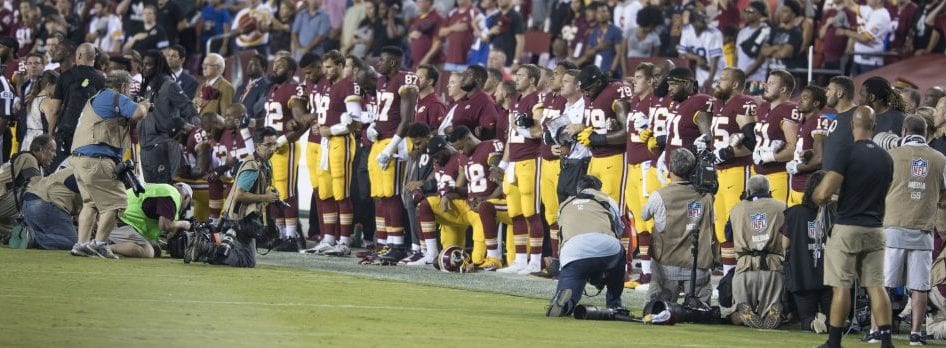As so often happens whenever there’s a hot-button issue, folks with differing political views are having extremely divergent reactions to the recent uptick in protests by NFL players taking a knee during the National Anthem.
Originally begun quietly by then-San Francisco QB Colin Kapernick in reaction to what he believed to be systemic racism in the United States, the action has become much more widespread during the early 2017 season, with players joining in reaction to President Donald Trump’s angry tirades against the practice (not to mention the suggestion that league owners should fire players who participate). His remarks at a political rally in Alabama on September 22 doubled down on his beliefs, after which more than 100 players participated in protests the following Sunday.
Support has come from minority groups as well as a network of left-leaning outlets. The right has been strong in its condemnation, with reports of fans burning their team apparel in reaction to their players joining the protest.
But has the protest movement and angry fan reaction actually changed the business of the NFL? Or is it a situation where a vocal minority is crying out, but the majority are operating as they always had on Sundays.
The truth, at this point, is pretty much impossible to determine outside of one’s own biases on the matter.
On September 29th, Jonathan Berr wrote a piece on the affect the protests were having for CBS News, titled “NFL National Anthem Protest Denting Ticket Sales.”
Operators of two of the largest U.S. ticket marketplaces say they are seeing declines in orders for NFL games amid festering controversy over the national anthem.
NFL ticket sales at TickPick slumped 17.9 percent this week compared with the prior week, their steepest decline since 2014, while sales at TicketCity plunged 31 percent. For pro football games in September, ticket sales at TicketCity are down 16 percent from a year ago. TickPick’s NFL sales rose this month, but by the smallest margin since 2015. The vendors’ data reflect tickets sold in the secondary market, as opposed to direct sales from NFL teams.
But the numbers aren’t always what they seem. For example – The former San Diego Chargers have had major attendance woes in their first season playing as the Los Angeles Chargers, playing home games at the tiny StubHub center in front of miniscule crowds. The Los Angeles Rams, playing in the cavernous LA Coleseum, have also suffered attendance-wise in their second LA season since relocating from St. Louis, challenging the NFL record for the largest drop in attendance from one year to the next.
“We have not seen a noticeable net impact on the demand for NFL tickets, one way or the other,” said SeatGeek content analyst Chris Leyden in a piece on Bloomberg. “This does not mean there has been no impact, but rather that any sort of boycott impact has been evened out by the added publicity and support for the sport.”
Anecdotally, the market seems plenty strong for high quality contests with engaged fan bases. In the daily report on Market Heat from the TicketNetwork sales figures, Nine of the Top 20 events sold in their market on Tuesday were NFL games, including three of the Top 5, and the No. 1 event on the day, an upcoming Dallas Cowboys vs. Green Bay Packers playoff rematch.
Mike Guiffre, VP of Sales for Ticket City and an occasional TicketNews contributor, told CBS “[The NFL has] not effectively branded, priced, marketed or sold tickets in a modern enough fashion and have counted on season ticket sales and corporate seats for far too long,” he said in an email. “It drove the fans away slowly.”
Ultimately, whether or not tickets are even selling at a substantially slower pace is in question, so the reasons for any shift are far too wide in potential to point at one thing or another. Increasing scrutiny of the mental damage players suffer as research uncovers more evidence of the prevalence of CTE is undoubtedly driving some fans away. Gigantic costs associated with the fan experience – from sky-high PSLs that teams refuse to refund even when they skip town to the gameday concession wallet punch could also be a factor.
Political anger over protests is likely also causing the numbers to shift – but at this point, it seems entirely premature to declare that it is causing any significant damage to the league brand, if any.




